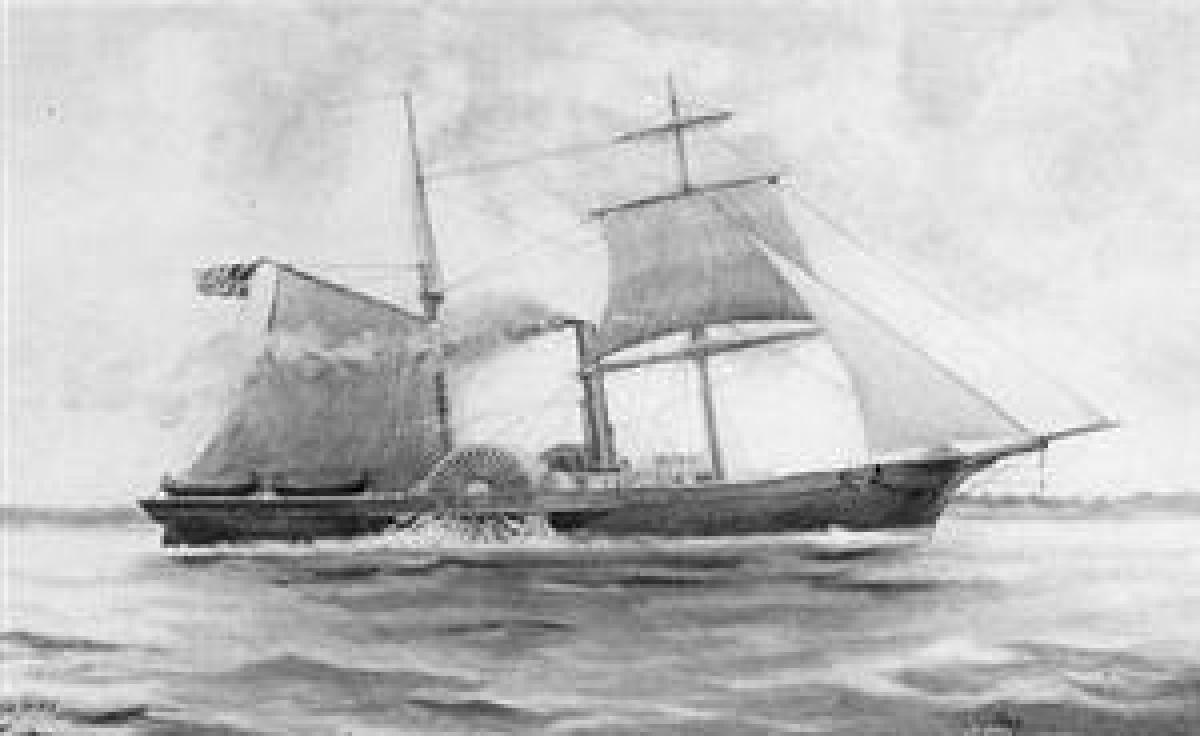In mid-1862, David Dixon Porter had been ordered to take command of a mortar flotilla at Key West. For the voyage south from the Washington Navy Yard, he embarked in the USS Harriet Lane, a former revenuecutter then serving in the Union Navy. Commodore Porter took an instant liking to the energetic second in command, Lieutenant Commander Edward Lea.
Making her way down the Potomac, the Harriet Lane ran a gauntlet of fire from Confederate shore batteries near a place called Cockpit Point. When Confederate shots hit one of the ship's two side wheels and tore into her stack, Lea was indignant that "they have dared to fire on the flag!" and asked Porter if they could return fire. The older officer patiently explained that they would be wasting their shot on the well-concealed enemy shore batteries, but then consoled Lea by saying, "You will have firing enough before the war is over."
To Porter, Lea's reverence for the flag and his eagerness to fight were amplified because, in Porter's words, Lea "was a full-blooded Southerner, born in the very heart of Secessia." As Lea explained to the commodore, "I am a Southern man, and my family have disowned me because I would not join what they call the Confederate cause. My father says if he should ever meet me in battle he would shoot me like a dog. How can I help hating a cause that has taken all the love of my family from me?"
When the two men parted ways some weeks later, Lea told Porter, "I shall never see you again, for I feel that I have but a short time to stay here." The young officer was unfortunately prescient.
That fall, after Union forces took Galveston, the Harriet Lane was one of the ships guarding the harbor when Confederate forces, under Confederate Major General John MacGruder, mounted a counterattack to recapture the island city. Several river-steamers, loaded with Confederate troops and protected by piles of cotton bales, attacked the Union ship. She proved no match for the "cottonclads." After several murderous volleys, no one was left standing on her decks. Her captain had been killed in the first volley, and soon thereafter her executive officer, Lieutenant Commander Lea, was also cut down.
As fate would have it, General MacGruder had dispatched one of his staff officers to monitor the engagement from the roof of one of the taller buildings in Galveston. Observing the clear Confederate victory, the officer went to the waterfront in the aftermath and boarded the captured Harriet Lane.
There, Major Albert Miller Lea found his son Edward bleeding from several gunshot wounds. In contrast to his earlier words, the elder Lea showed great concern and hurriedly went in search of medical attention for his son. While his father was gone, Edward's surviving shipmates and several of the Confederate soldiers asked if they could do anything to ease his pain. But the young man declined, repeatedly saying only, "My father is here." Before Major Lea could return, however, his son died.
With a large contingent of Confederate soldiers and Union prisoners in attendance, Edward Lea was laid to rest at Trinity Episcopal Cemetery in Galveston. Today, his last words can still be read on the weathered tombstone marking his grave: "My father is here."



